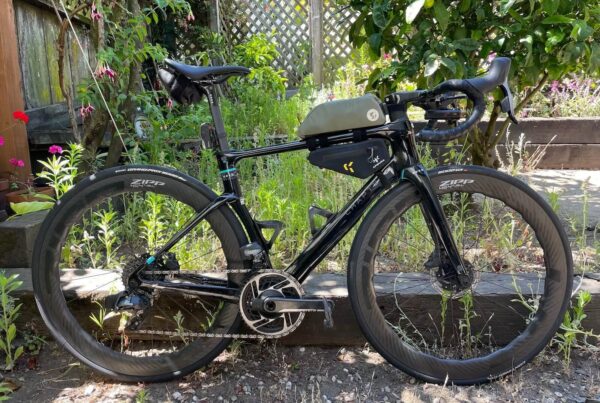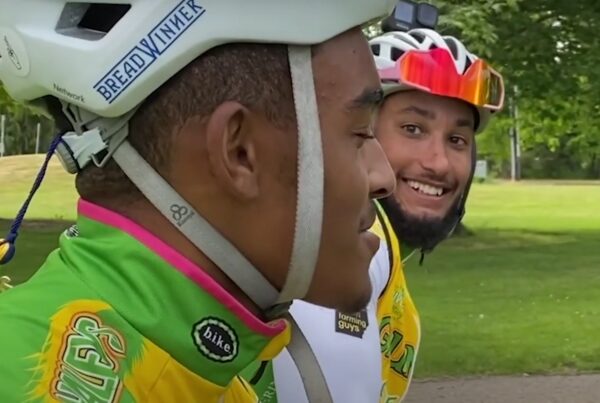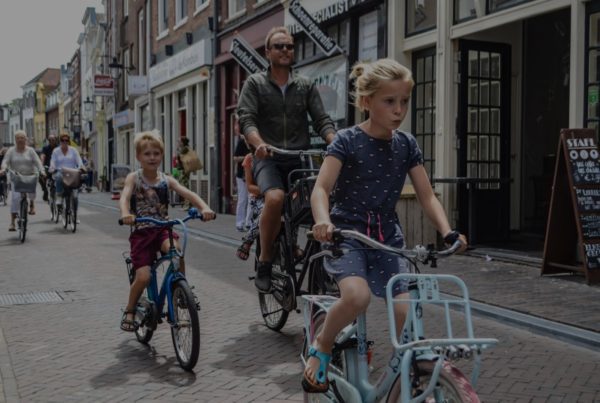By Tom Held
Nov. 9, 2007
Conflicts between motorists and cyclists date back more than 100 years, almost from the moment two-wheeled velocipedes and horseless carriages crossed paths on New York City streets.
The start of the often-tense relationship, in 1896, serves as a historical introduction to Bob Mionske‘s new book, “Bicycling & the Law,” published by VeloPress.
The guide is a terrific resource for cyclists, covering the laws of the road and advising them to protect their rights and legal options in conflicts with motorists and even product liability issues when parts and bones break. (Click on this for an example of his advocacy).
Cycling fans will know Mionske from his regular columns on the VeloNewsweb site, and older residents of Twin Lakes, near Lake Geneva, Wis., will remember him as the kid who raced to Wilmot High School in the 1970s.
The 45-year-old went on to the University of Wisconsin in Madison, turned from skier to biker and raced in the 1988 and 1992 Olympics. After leaving the front of the peloton to the likes of Lance Armstrong and Bobby Julich, Mionske went to law school, then started a practice in Portland, Oregon in 1999. He found a niche representing cyclists and turned that into a profession and now a mission.
I spied the red cover of Mionske’s book in a Harry W. Schwartz store a couple weeks back, and the sight jarred me into thinking I ought to gear up and share some of the conversation I had some time ago with the former Badger.
His book, and our chat, covered a lot of ground with regard to the history of the law and how it applies to cyclists.
The book early on raises the point that there’s a constitutional right to bicycle on public roadways. Is that a stretch or is that grounded in solid law?
“I lay it out as slowly and clearly as I can. People are so ready to ask what rights they have instead of looking at the constitution and saying we have this right. This is probably the dearest subject to my heart in the book, based on what I see happening in society right now.
“The authority tends to look at cyclists as scofflaws, people that they can’t control as easily.”
What would you list as the most common myths or misinterpretations of the law on the part of both cyclists and motorists?
“I guess the fact that cyclists have a right to the road and in many states their bike is actually considered a vehicle, but in any case they have the same right to the road as cars do. I think that’s probably the most misunderstood and surprising fact for people in cars.
“Police tell people to get off the road, maybe not in Wisconsin and Oregon, but in other parts of the country, they yell at them to get off the road, even though it’s lawful.
“I would say that cyclists, they don’t realize they can get a ticket for speeding, they can get a ticket for moving infractions, running stop signs, riding at night without lights. They don’t recognize they can be ticketed and held responsible for their infractions.”
In the book you wrote that police find cyclists more abrasive during traffic stops. Do you think that’s truly the case?
“I do think its generally the case and I think its because cyclists are a minority compared to people who drive cars that are transporting them in society. They are a small group and they know the rules and they know the laws and when they’re pulled over, if they don’t feel they committed an infraction, they’re defiant.
“How often do people get pulled over in cars where the officer is condemning them for breaking the law they didn’t break? It happens to cyclists all the time, so the line is drawn in the sand between cyclists and the authority.
“A motorist gets pulled over and they’re thinking of their insurance rates and they’re thinking of court dates and they’re hopeful they’re going to get a warning. They’re usually a lot more obsequious.”
I know you covered this in the book to some extent, but what is the cause of the animosity that motorists have toward cyclists:
“There’s the basic psychology of limited resources. The road is only so wide, and they’ve been driving their car down that road and now there’s a cyclist in front of them that they feel is getting in their way, that basically has a toy in the street.
“Swinging in the other direction, you have the cyclist who absolutely ignores every traffic law, rides down the sidewalk, then he goes through the crosswalk, and if a motorist doesn’t see him he flips him off. Then he jumps on the road in the wrong direction and he doesn’t have lights on at night.
“That really perturbs a driver.
“I guess it’s two groups that have different ideas about the roads are like and what their rights and responsibilities are.”
What started you down the path to explore the historical aspects of cycling and the law?
“Being a lawyer, I thought, well we have to look at the law, the rule of law. Doing that research, it’s hard not to look.
“You look at a case law decision by a judge talking about cycling and he refers to another case for precedent. Naturally, you want to go see what they said in that case and you keep doing that and you end up kind of at the birth of the traffic laws in the United States, and there you have stage coaches and bicyclists and horse-drawn carriages and then the first motorized cars and you realize the history of cycling laws is really the history of traffic laws.
“When they first decided we have to have some rule, bikes were in the mix.
“If you’re a cyclist you belong to this group and they were in your group too. There’s a pride almost. It just captivated me, the historical element of bicycle law.
What really stood out from your historical study of cycling law?
“The first thing comes to mind is that almost the exact same kind of road rage, bike versus other vehicle violence was there right at the beginning.
“The scorchers they called them, the cyclists that were bombing around New York running people down and the stage coach drivers that were trying purposely to block them and knock them off the road. That’s still happening today.”
Mionske has started a limited tour to support his book and will expand his travels early next year. Off the Couch will list any Milwaukee-area appearances as soon as they’re confirmed.



